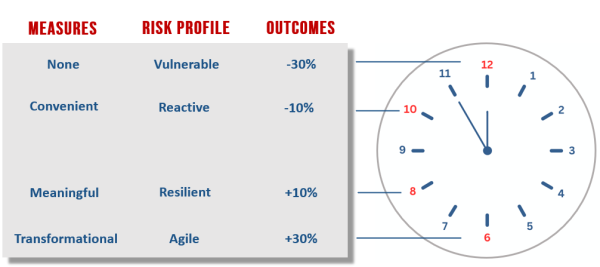Navigating KRIs
A Deep Dive Into Key Risk Indicators
Design measures that transform your organisation into an uber adaptive one by getting early warnings on key risks many times earlier than with standard KRIs
What you will learn
- The role KRIs play in business decision making.
- An appreciation of the dos and don’ts of KRIs to ensure validity.
- How you can utilise KRIs to add value to the business.
Having responsibility for producing KRIs can be a burden. There is no standard or rule book to follow. Irrespective, you are expected to deliver early warnings for the Board and Executive.
Mundane KRIs are as easy to find as risks. You just have to do some brainstorming. What you end up with is a long list of mediocre measures that turns KRI production into an industry.
Invaluable KRIs are much harder to find, design and implement than most people understand. But they are the ones that transform organisations because of the early warning they deliver.
This course will provide you with a much deeper understanding of what good KRIs look like and where to source them. In particular for non-financial risks which many find hard to measure.
Most importantly, you will work through a practical case study of historical significance, all the way through to having critical conversations with the business on the value and implications of invaluable KRIs.
Course Outline
This is an online interactive course run over two half-days, with ample time to participate, share and network.
Part One: Why transformational KRIs and where to find them?
- Why you want to choose reliable measures instead of convenient measures
- Understanding the trade-off of error vs early warning
- Where to start when looking for KRIs
- Group exercise – Identifying possible KRIs in your organisation
Part Two: How to design transformative KRIs
- Establishing hypotheses as a basis for design
- Do’s and don’ts of creating hypotheses
- A simple tool for assessing your design
- Group exercise: Developing hypotheses for a famous historical example
Part Three: How to measure transformative KRIs
- The different ways to measure KRIs
- How to interpret the result
- How to present data on KRIs to spark critical conversations
- Group exercise – Data analysis to determine the effectiveness of KRIs
About Bryan
Bryan Whitefield is a management consultant operating since 2001, specialising in risk-based decision making, born from his more than twenty years of facilitating executive and board workshops. Bryan’s experience as a risk practitioner includes the design and implementation of risk management programs for more than 150 organisations across the public, private and not-for- profit sectors. Bryan is author of Risky Business: How Successful Organisations Embrace Uncertainty; Persuasive Advising: How to Turn Red Tape into Blue Ribbon and is writing Team Think: How Teams Make Great Decisions. He was President and Chair of the RMIA from 2013 – 2015. He is licenced by the RMIA as a Certified Chief Risk Officer (CCRO) and is the designer and facilitator of their flagship Enterprise Risk Course since 2019.
Course Details
Contact Bryan for upcoming Navigating KRIs Course Dates HERE
Time: 4 hours x 2 Half Day Online Learning Workshops, total 8 hours.
Location: Online Zoom Meeting
SESSION 1 (4hours)
1:00pm-5:00pm AEDT Tuesday, 30th January
SESSION 2 (4 hours)
1:00pm-5:00pm AEDT Thursday, 1st February
Price: $1,980.00 incl. GST
Group Bookings: For Group Bookings, please contact Bryan’s Team HERE
About Andrew
Armed with a PhD in Statistics and Engineering, Dr Andrew Pratley has ten years of experiencein helping companies see the value in their data. He is author of Inside Job: Doing the work you want with the job you have and when not helping clients use data to solve their most pressing problems or serving as a subject matter expert in government and legal forums, Andrew serves as a regular commentator in the media and at industry conferences on issues of data, analytics and insights.

